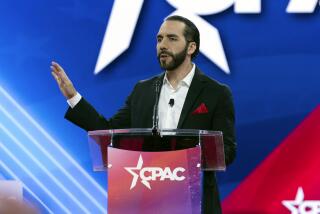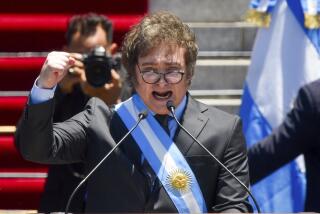An Unbending Castro Makes His Pitch : Latin America: Cuban leader seeks recognition and economic alliances at summit in Mexico. But he hews to his socialist line.
- Share via
GUADALAJARA — Cuban President Fidel Castro wore the only uniform Thursday to Latin America’s first regional summit of the 1990s.
Clad in military tunic and a black tie, the revolutionary who has ruled Cuba for half his 64 years took his seat as the odd man out--the champion of a one-party socialist state shunned as a dinosaur by the younger crowd of civilian democrats at the table. His eight-minute speech betrayed no willingness to modify his regime or tone down his hostility to the United States.
But Castro’s first appearance ever at a formal Latin summit, along with 20 elected heads of government, the king of Spain and the secretary general of the United Nations, was a landmark in Washington’s declining capacity to cut him off from the rest of the hemisphere.
Seeking full political recognition and a place in the region’s growing web of economic alliances, Castro heard advice to make his Caribbean island more capitalist and democratic.
But without demanding such changes as a condition, or even getting Castro to promise any, South America’s two healthiest economies, Chile and Colombia, announced a partial renewal of diplomatic ties broken with Cuba in the 1970s.
Colombian President Cesar Gaviria, one of four leaders who met separately with Castro before the summit, said it was futile to expect even minimal changes from such an ardent socialist as long as he seemed isolated or under pressure.
“We hope that one day Cuba makes the political and economic changes needed to fall into step with the inter-American system,” Gaviria said.
The crumbling of the Soviet economy and the collapse of allied Communist regimes across Eastern Europe have brought severe economic shortages to Cuba. The two-day meeting here was Castro’s opportunity to seek new trading partners and investors in Latin America, which accounts for less than 3% of Cuba’s trade.
Officially, the First Iberian-American Summit centered on the region’s consolidation into free-trade blocs under the inspiration of President Bush’s Enterprise of the Americas Initiative, and on cooperation with Spain and Portgual, whose leaders are attending.
But Castro, the only unelected president at the table, was clearly the center of attention.
He dismissed Bush’s debt-slashing economic initiative, widely praised in the rest of Latin America, as “an illusion.”
But pleading for acceptance, he said: “Cuba is willing to belong to an integrated and united Latin America, to discuss any subject.”
Several Latin leaders came with complaints against Castro. Salvadoran President Alfredo Cristiani has accused Cuba of arming leftist guerrillas in his country. Argentina has censured Castro’s crackdowns on dissent.
U.S. officials, who were not invited to the Mexican-organized summit, said they hoped such grievances would rain on Castro here. But nobody criticized him by name in Thursday’s speeches. Spanish Prime Minister Felipe Gonzalez lectured him indirectly, however, urging Latin America to “let parliaments and peoples write its history and leave guerrilla exploits to the novelists.”
Mexican organizers did not invite Bush and asked other leaders not to single out Castro.
Chile, which broke diplomatic ties with Cuba after a 1973 military coup, and Colombia, which did so in 1979, announced they would open consulates in Cuba, a step short of full relations. Their officials said Cuba has stopped supporting insurgencies in both countries.
That left Cuba lacking diplomatic ties with six Latin American nations: Costa Rica, Dominican Republic, El Salvador, Guatemala, Honduras and Paraguay.
Diplomats said the summit could advance a consensus to readmit Cuba to the Organization of American States, which suspended Cuba under U.S. pressure in 1962.
But regional specialists doubt that Latin America leaders can entice Cuba away from socialism because they lack cash for a full economic bailout. Havana’s more modest goals include new markets for medical products of its biotechnical research and investment in its beach resorts. Short of oil, Cuba has offered Mexico access to an idled refinery in exchange.
Such trade hopes are limited by Cuba’s failure since 1986 to make payments on a $6-billion debt to foreign governments. The debt is a serious problem with Mexico, Argentina, Venezuela and Ecuador.
“Diplomatically, the Latin American countries would just as soon have Cuba join the club,” said Gillian Gunn, a Cuba specialist at the Carnegie Endowment for International Peace in Washington. “But economically, I don’t think Castro can make much progress at the summit. His real problem isn’t U.S. pressure on his neighbors or differing ideologies. His real problem is that Cuba is not paying the bills.”
More to Read
Sign up for Essential California
The most important California stories and recommendations in your inbox every morning.
You may occasionally receive promotional content from the Los Angeles Times.










